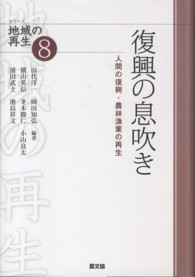- ホーム
- > 洋書
- > 英文書
- > History / World
Full Description
In Thought Crime Max M. Ward explores the Japanese state's efforts to suppress political radicalism in the 1920s and 1930s. Ward traces the evolution of an antiradical law called the Peace Preservation Law, from its initial application to suppress communism and anticolonial nationalism-what authorities deemed thought crime-to its expansion into an elaborate system to reform and ideologically convert thousands of thought criminals throughout the Japanese Empire. To enforce the law, the government enlisted a number of nonstate actors, who included monks, family members, and community leaders. Throughout, Ward illuminates the complex processes through which the law articulated imperial ideology and how this ideology was transformed and disseminated through the law's application over its twenty-year history. In so doing, he shows how the Peace Preservation Law provides a window into understanding how modern states develop ideological apparatuses to subject their respective populations.
Contents
Preface: Policing Ideological Threats, Then and Now ix
Acknowledgments xv
Introduction. The Ghost in the Machine: Emperor System Ideology and the Peace Preservation Law Apparatus 1
1. Kokutai and the Aporias of Imperial Sovereignty: The Passage of the Peace Preservation Law in 1925 21
2. Transcriptions of Power: Repression and Rehabilitation in the Early Peace Preservation Law Apparatus, 1925-1933 49
3. Apparatuses of Subjection: The Rehabilitation of Thought Criminals in the Early 1930s 77
4. Nurturing the Ideological Avowal: Toward the Codification of Tenkō in 1936 123
5. The Ideology of Conversion: Tenkō on the Eve of Total War 145
Epilogue. The Legacies of the Thought Rehabilitation System in Postwar Japan 179
Notes 185
Bibliography 261
Index 281








